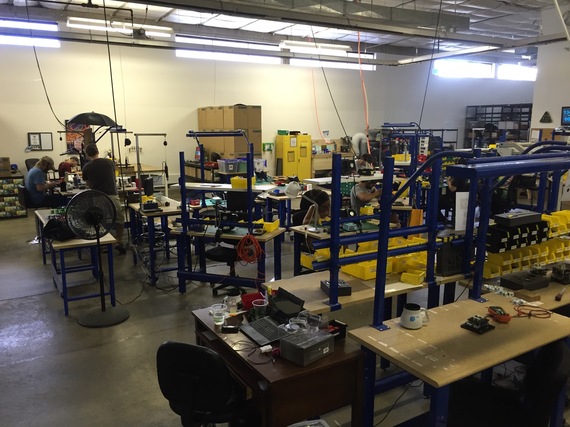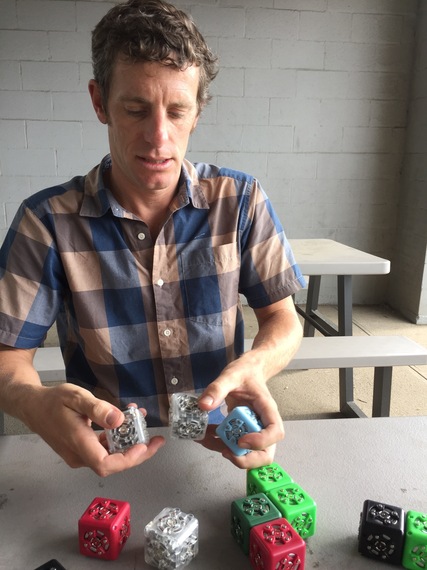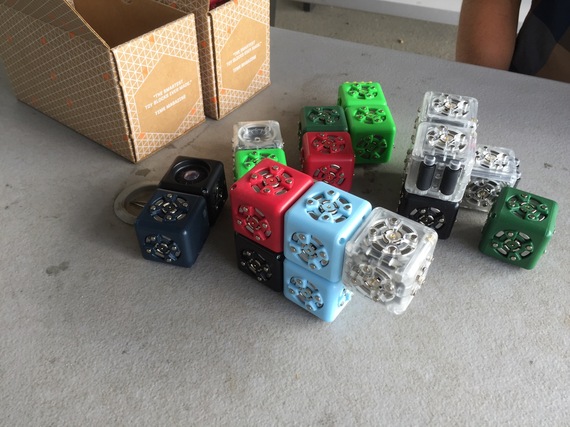"Smart" toys for the next generation hold the key to the business world's bright future

Out of a former post office tucked away in an industrial section of Boulder, CO, startup Mod Robotics develops toys for children to help them learn and thrive in an increasingly complex world. Though the popular mantra of KISS (Keep it simple, stupid) rings true with many of today's business professionals, Eric Schweikardt, Mod Robotics founder with a PhD in Computational Design, would argue that keeping it simple might actually cause future generations to become less capable of managing the realities of a highly technical world.
According to Eric, the solution is to equip kids at a very young age with the ways to become more familiar with the world's increasing complexity - ideally ways that are fun and engaging - to where handling complexity is second nature, better preparing them for the future ahead. To Eric, this solution manifests in Mod Robotics' toy robots that look like standard building blocks but are, in fact, "smart."
Modular, familiar components are the core
Eric and I sit outside at a picnic table for our conversation under an overhang of the warehouse-like building - a building that serves as both the headquarters and the manufacturing plant for these unique toys. Reaching for two handfuls of the robot blocks - known as Cubelets - he places them on the table and begins introducing the different types.

"What do you call these?" I ask.
"Cubelets," Eric replies with a giddy smile. "Everybody loves blocks like Legos and those construction kits," Eric says. "I think lots of creative people played with construction kits, and this is what happens when you put robot stuff inside of a construction kit."
The key component of Cubelets is that they are modular and familiar, a form reminiscent of wooden blocks, and are easy to manipulate. The trick is that these toy robots are "smart," each with a different function, and when clicked together in different configurations, they behave differently.
"Each little Cubelet has a tiny computer inside of it," Eric explains. "All of the clear ones are action blocks - they do things. All the black ones are sensor blocks - they sense things like our senses do." In essence, the sensor blocks can "see" and then communicate to the other blocks what action to take, such as roll forward, or turn on the flashlight.
Eliminate clutter through mixing and matching
Rather than having to reprogram each Cubelet, the mixing and matching of the blocks seemingly create new robots, an entirely different approach to how the current set of intelligent robots are being created, which are single form and single function. If this approach was continued, we would live in a world cluttered with robots due to each of their confined and specific use. Following the path of the Cubelets, a person could create a variety of robots from a simple set of components. This is precisely the type of solution future generations will need in order to tackle ever more complex problems - essentially doing more with less.
Eric explains, "We just got a robot to do what we wanted. To switch its behavior, we just built a robot by snapping some physical blocks together. By snapping the physical blocks together, you're obviously building the body of the robot, but you're also building the code. And it's a different model of building robotics for every other robot out there."
We need a new acronym
This new approach calls for a clever acronym, one that reminds us that complexity over simplicity might be the real solution. As Eric speaks, it becomes clear that each day we are exposed to a number of variables, so many inputs to decipher. It's likely this degree of variability wasn't something previous generations had to manage, and I can only imagine the steady increase that kids will have to navigate in the years to come.
Eric continues, "So they [kids] can begin to gain intuition and build complex systems so that when they're older, it won't come as a shock that there are rarely simple answers in the world, and that it's rarely black and white, good or bad, red or blue. And that the world is actually more complicated."

Making complex solutions a reality
In order to make our own complex solutions into reality, it's as simple as just making something. Eric explains, "Ideas are worthless. If you're inventing a new type of electric car, you don't have to build the electric car from scratch to get conversation started, but you can build prototypes of the one innovation that you think will make your electric car much cooler than the other. That's how we all learn...by failing early, by building something, by testing, and by trying it out. And for some reason, especially entrepreneurial communities, you hear about a lot of people who it never occurred to them to make something. They're talking about getting off the ground. They don't have any traction because everybody's trying to figure out these ideals and they're all over the place. But as soon as you make something, you can talk about it with somebody and it's extremely powerful."
To read a longer interview with Eric Schweikardt, Mod Robotics founder, go here: https://www.verizon.com/about/news/complexity-now
